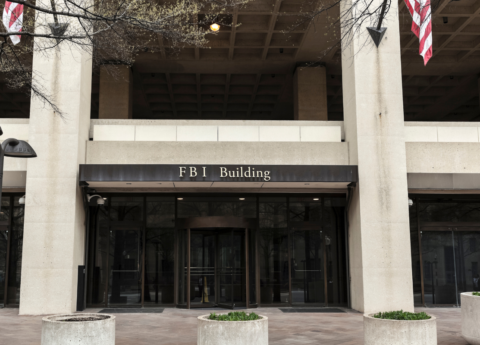This year, the Kentucky General Assembly took important steps forward in criminal justice with the passage of policies that will reduce incarceration and related harms in modest but important ways in several areas including policing, sentencing, juvenile justice and reentry. While this legislative session saw important legislative victories, future legislative sessions will need to do more to reduce incarceration and achieve broad systemic change in the Kentucky criminal justice system.
Policing
Senate Bill (SB) 4 significantly limits the issuance and use of no-knock warrants, and represents an important step forward in the demilitarization of police in Kentucky. It will also help to reduce the harms associated with the execution of no-knock warrants — harms that have primarily impacted Black people.
SB 4 significantly restricts the use of no-knock warrants to primarily exigent and high-risk circumstances, effectively ending the use of most no-knock warrants in Kentucky and essentially serving as a ban on the practice of using no-knock warrants for low-level drug searches.
Another notable measure aimed at greater police oversight and accountability is SB 80, which attempts to strengthen and enhance the process by which police officers can be decertified, and requires officers to intervene when another officer is using unjustified excessive force.
Sentencing
Two bills will make modest but important reductions in incarceration by raising the dollar amount threshold at which a crime becomes a felony. In addition to lengthening the time of incarceration, a felony conviction carries with it collateral consequences that include difficulty securing employment, particularly a good job and housing, among others.
House Bill (HB) 126 increases the felony theft threshold from $500 to $1,000. Although still modest in comparison to the level established in some states, this increase, which is the first in over a decade, does put Kentucky more in line with other neighboring states.
HB 402 raises the amount in past-due child support payments (“flagrant nonsupport”) that constitutes a felony from $1,000 to $2,500. This is an important and much-needed change, particularly given the fact that incarceration and a felony conviction actually make it more difficult for someone to make these payments.
Reentry from incarceration
HB 497 includes a new certificate for incarcerated people who participate in work or programming while incarcerated, guarantees that a person leaving incarceration will be provided copies of important paperwork that will assist with reentry, and further encourages the expansion of other supports provided to individuals leaving incarceration such as providing Medicaid 30 days before release if the state receives an 1115 waiver and receiving a photo ID when leaving incarceration.
One significant support provided by this bill is that is finally does away with the state’s partial ban from receiving food assistance (Supplemental Nutrition Assistance Program or SNAP benefits) or cash assistance (Temporary Assistance for Needy Families or TANF) for people who have previously been convicted of a drug-related felony. Nearly 7,000 Kentuckians have been denied or disqualified from SNAP or TANF benefits due to this ban in just the last two years.
Juvenile justice
The passage of SB 32 (formerly SB 36) will result in fewer felony charges against children in adult court. SB 32 repeals language that provided for the mandatory transfer of a child to adult court in any case in which the child is charged with a felony in which a firearm, whether functional or not, was present. The new language provides discretion to the judge and prosecutor, considering the facts and circumstances of each case. This policy change will reduce incarceration and harms to justice-involved youth, and address some of the racial inequities in the juvenile justice system.
Improvement in conditions of confinement for pregnant women
SB 84 adds some protections and additional supports for incarcerated women who are pregnant and give birth. The bill prohibits the placement of any woman who is pregnant or in the postpartum period from being placed in restrictive custody, segregation or solitary confinement, allows the mother and baby 72 hours together after the birth, and requires postpartum care and access to social workers and programs for the mother to assist in reunification with their child.
“Performance funding” for jails
The final version of HB 556 included an appropriation for fiscal years 2022 through 2024 for additional funds for local jails when an individual serving a state sentence leaves incarceration having completed a Department of Corrections-approved program or programs resulting in a sentencing credit. Jails can receive between $300 and $1,000 depending on the type of program and amount of credit earned. In addition, jails will receive an increased per diem of $2 or $10 per day for each person enrolled in a program while in the facility with the amount dependent on the program.
While the opportunity to participate in a program while incarcerated may have some benefit to incarcerated individuals, the state’s focus should be on reducing incarceration — and providing needed services and supports in communities — rather than expanding programs in jails in ways that have the potential to increase incarceration. Counties are already incentivized to expand jails in order to receive funds for housing individuals in state custody. These additional state dollars for programming could provide further incentive for jail expansion, and the expansion of jails has been shown to contribute to increased incarceration (“If you build it, they will fill it”).
What it all means
Many of the policy changes outlined above move us forward and represent a step in the right direction. However, the fact remains that too many Kentuckians are incarcerated or otherwise trapped in our criminal punishment system.
Other significant items introduced this session, but didn’t move forward, include SB 223, a bill to incrementally reduce pretrial incarceration, SB 224 relating to the persistent felony offender law and several bills related to cannabis legalization, which all would have been helpful in addressing incarceration and criminalization in Kentucky.
In future legislative sessions, the general assembly must do much more to build on work of this session and address critical issues such as policing violence, expanded sentencing reform, racial inequity in the juvenile justice system, and support for reentry from incarceration. Furthermore, much work remains to be done to address our culture of punishment and entrenchment, and the perverse economic incentives and financial dependencies on criminal systems.




